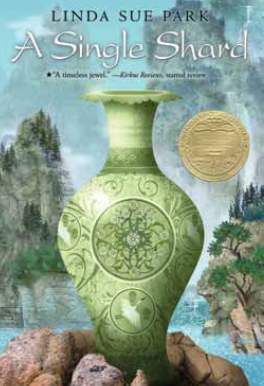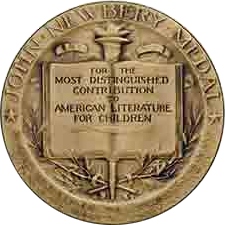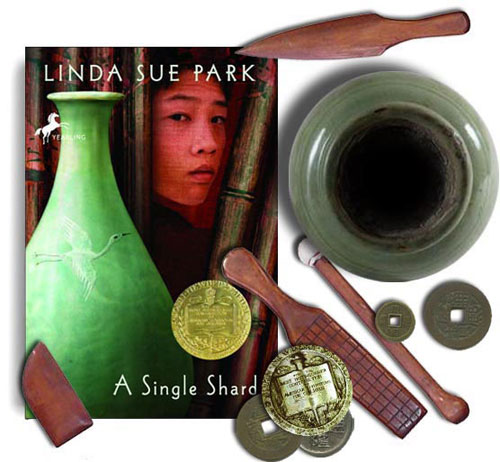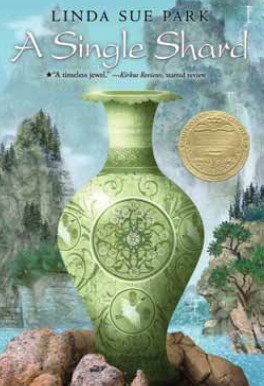
by Linda Sue Park
Clarion Books, 2001
Language: English
Hardcover: 978-0395978276
Paperback: 978-0547534268
160 pages, ages 10-12

Winner of the
2002 Newbery Medal
A Single Shard
Tree-ear is an orphan boy in a 12th-century Korean potters’ village. For a long time he is content living with Crane-man under a bridge barely surviving on scraps of food. All that changes when he sees master potter Min making his beautiful pottery. Tree-ear sneaks back to Min’s workplace and dreams of creating his own pots someday. When he accidentally breaks a pot, he must work for the master to pay for the damage. Though the work is long and hard, Tree-ear is eager to learn. Then he is sent to the King’s Court to show the master’s pottery. Little does Tree-ear know that this difficult and dangerous journey will change his life forever.
Resources
Watch a video of Korean pottery masters at work.
A wonderful pantomime, produced by the Literature Translation Institute of Korea.
Read an excerpt from A Single Shard.
After you’ve read the book, here’s some insider information you might like to know.

“7 Multimodal Works for Expanding on ‘A Single Shard’ by Linda Sue Park | Refreshing the Canon,” NCTE & SLJ Reviews, School Library Journal, 24 May 2023
“30 of the Most Influential Children’s Books of All Time,” Annika Barranti Klein, Book Riot, 9 August 2022
Recognition
2002 Newbery Medal Book
2002 ALA Best Book for Young Adults
2002 ALA Notable Book for Children
2003 Asian/Pacific American Award for Literature, Author Honor
2001 Booklist Editor’s Choice
2001 Capitol Choices Selection
2001 CCBC Choices
2003-2004 Charlie May Simon Book Award Nominee (AR)
2003 Dorothy Canfield Fisher Book Award Nominee (VT)
2003-2004 Lamplighter Award Nominee
2003-2004 Massachusetts Children’s Book Award Nominee
2002 NCTE Adventuring with Books: Booklist for Pre-K – Grade 6
NCTE Kaleidoscope: A Multicultural Booklist for Grades K-8
2005 Nene Award Nominee (HI)
2001 New York Public Library, 100 Titles for Reading and Sharing
2002 Notable Books for a Global Society (ILA)
2003 Pennsylvania Young Reader’s Choice Award Nominee
2006 Rebecca Caudill Young Readers Book Award Master List (IL)
2001 School Library Journal, Best Books of the Year
2004 Sequoyah Book Award (OK)
2004 William Allen White Children’s Book Award Nominee (KS)
2004 Young Reader’s Choice Award—Intermediate, Grades 7-9 Winner
Reviews
“Park (Seesaw Girl) molds a moving tribute to perseverance and creativity in this finely etched novel set in mid- to late-12th-century Korea. In Ch'ul'po, a potter's village, Crane-man (so called because of one shriveled leg) raises 10-year-old orphan Tree-Ear (named for a mushroom that grows ‘without benefit of parent-seed’). Though the pair reside under a bridge, surviving on cast-off rubbish and fallen grains of rice, they believe ‘stealing and begging ... made a man no better than a dog.’ From afar, Tree-Ear admires the work of the potters until he accidentally destroys a piece by Min, the most talented of the town’s craftsmen, and pays his debt in servitude for nine days. Park convincingly conveys how a community of artists works (chopping wood for a communal kiln, cutting clay to be thrown, etc.) and effectively builds the relationships between characters through their actions (e.g., Tree-Ear hides half his lunch each day for Crane-man, and Min's soft-hearted wife surreptitiously fills the bowl). She charts Tree-Ear's transformation from apprentice to artist and portrays his selflessness during a pilgrimage to Songdo to show Min's work to the royal court—he faithfully continues even after robbers shatter the work and he has only a single shard to show. Readers will not soon forget these characters or their sacrifices.”
—Publishers Weekly (starred review)
“A homeless boy in a 12th-century Korean village makes himself surprisingly useful to a master potter. Tree-ear has been living with Crane-man under a bridge, scavenging for food and comfort until one day he watches Min, the potter, becoming so fascinated he later creeps back to look at the finished pots. Surprised in the act, one of the pots is broken and Tree-ear must work to pay for the damage. The work is strenuous. Tree-ear aches and bleeds, but gradually he becomes accustomed to the work. Min allows him to continue to help in exchange for food from the master's kind wife. It is in the details that the story lays claim to a sort of Zen quality. Ethical decisions regarding acceptance of lunch and his responsibility to Crane-man are decided with fastidiousness and rectitude. Each choice of Tree-ear's shows an awareness of pride and dignity—not just for himself, but for Crane-man, Min, and his wife. Obtaining a royal commission to make pots worthy of the palace is at the heart of the plot. Intrigues, danger, and the same strong focus on doing what is right turn a simple story into a compelling read. Important details of the times are folded into the narrative without being obtrusive. Tree-ear's story conveys a time and place far away and long ago, but with a simplicity and immediacy that is both graceful and unpretentious. A timeless jewel.”
—Kirkus Reviews, starred review
“In this tale of courage and devotion, a single shard from a celadon vase changes the life of a young boy and his master. In 12th-century Korea, the village of Ch'ulp'o is famous for its pottery. The orphan Tree-ear spends his days foraging for food for himself and Crane-man, a lame straw weaver who has cared for him for many years. Because of his wanderings, Tree-ear is familiar with all of the potters in the village, but he is especially drawn to Min. When he drops a piece Min has made, Tree-ear begins to work for him to pay off his debt, but stays on after the debt is paid because he longs to learn to create beautiful pots himself. Sent to the royal court to show the king’s emissary some new pottery, Tree-ear makes a long journey filled with disaster and learns what it means to have true courage. This quiet story is rich in the details of life in Korea during this period. In addition it gives a full picture of the painstaking process needed to produce celadon pottery. However, what truly stands out are the characters: the grumpy perfectionist Min; his kind wife; wise Crane-man; and most of all, Tree-ear, whose determination and lively intelligence result in good fortune. Like Park's Seesaw Girl (1999) and The Kite Fighters (2000, both Clarion), this book not only gives readers insight into an unfamiliar time and place, but it is also a great story.”
—Barbara Scotto, School Library Journal, starred review
“When the polite greeting in a society is ‘Have you eaten well today?’ one may guess that subsistence is of prime concern. Surely no one in this twelfth-century Korean village is more accustomed to hunger than the orphan boy Tree-ear and his guardian Crane-man, who is lame. They sleep under a bridge in summer and in a pit in winter, eating what they can forage in the woods or garbage piles. At the age of 12, Tree-ear becomes an assistant to the potter Min. A hard taskmaster to himself and the boy, Min is the maker of the finest celadon ware in Ch'ul'po, a village known for its pottery. When Min entrusts two precious pots to Tree-ear to deliver to Songdo, the boy must make his way across miles of unknown territory, relying on his courage and wits to prove himself worthy of Min's trust. This quiet, but involving story draws readers into a very different time and place. Though the society has its own conventions, the hearts and minds and stomachs of the characters are not so far removed from those of people today. Readers will feel the hunger and cold that Tree-ear experiences, as well as his shame, fear, gratitude, and love. A well-crafted novel with an unusual setting.”
—Carolyn Phelan, Booklist, starred review
“In 12th century Korea, young Tree-Ear is an orphan living with elderly Crane-Man. Crane-Man, too, is an outcast, but the two of them share a close and loving bond. Ch'ulp'o, where they live, is a village known throughout Korea and beyond for the lovely Celadon green glaze of the pottery created there. Tree-Ear is fascinated by pottery making, especially the work of potter Min, the finest in the village. When Tree-Ear accidentally breaks one of Min's creations, he goes to work for Min to compensate the potter for his loss. Once the debt is paid, Tree-Ear continues working for the gruff and taciturn Min, hoping that he will eventually get a chance to create something at the potter's wheel. In the meantime, he takes every opportunity he can to learn, and experiences startling and wonderfully evoked moments of deeper understanding of the mysteries of the art. He also shares the benefits of his work, such as the daily meal provided by Min's kind wife, with Crane-Man. A visit from the royal emissary, who has the power to assign coveted pottery commissions, ultimately has life-changing implications for Tree-Ear in Linda Sue Park's hard-to-put-down and highly appealing novel. An author's note provides additional historical information on the creation of Celadon pottery in Korea.”
—Cooperative Children's Book Center


